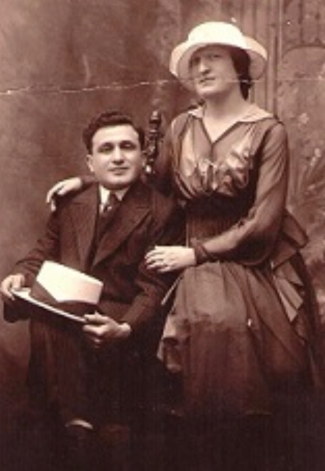Family Stories Keep Ancestral History Alive for Generations [GUEST POST]
March 26, 2019 Leave a comment

Journalist, historian and novelist Peter Golden knows what it takes to keep family legends alive. (Photo courtesy Peter Golden)
No one I’ve ever read has been more succinct on the subject of knowing your history than Marcus Tullius Cicero, a Roman statesman and philosopher who died over two thousand years ago.
Here is what Cicero said: “To be ignorant of what occurred before you were born is to remain always a child. For what is the worth of human life, unless it is woven into the life of our ancestors by the records of history?”
As for how I discovered my family’s past, I was curious about it for as long as I can remember, and I had more than a few good storytellers in my family. Below are some of the stories I heard, along with pictures.

Nathan and Mae, Peter Golden’s paternal grandparents (Photo courtesy Peter Golden)
My paternal grandparents, Mae and Nathan, who emigrated to America as children, told me stories from vanished empires—Mae from Austro-Hungary, Nathan from Russia.
Papa’s boyhood especially intrigued me because I was his age in his stories. His parents had split up in Russia, and his father had come to Newark, NJ, where he remarried and had another family. At twelve, Papa sailed for America alone and moved in with his father and went to work for a greengrocer. A year later, his father died. Papa didn’t move out of the house until he married, but even then he continued supporting the family.
As a child, whose life revolved around sports and double features on Saturday afternoons, I was overwhelmed imagining myself in his place. Yet Papa never mentioned the story that stayed with me. My father told me shortly before he died.
It was 1939. My father was fifteen. Nathan had built a successful wholesale seafood business in Newark, and he and my father were driving home from Manhattan after a buying trip to the Fulton Fish Market. My grandfather turned up a ramp of the West Side Highway and nearly hit a police car head-on. Both cars stopped, and the cop stormed over to the driver’s side window and shouted at my grandfather, asking him what the hell he was doing. Nathan began to explain, in a way that made no sense, why he had entered the highway on an exit ramp.
It was soon apparent to the policeman—and my father—that Nathan couldn’t read English. In a gentle voice, the cop told my grandfather to be careful and didn’t ticket him. Papa drove to Newark without saying another word. My father never mentioned the incident until he told me about it sixty years later.
Sometimes, while I’m sitting at my computer, I whisper, “Listen to me, Papa. You don’t have to read. I’ll tell you the story.”

Peter Golden’s mother, Evelyn, was haunted by her childhood. (Photo courtesy Peter Golden)
My mother died young, before I ever published a book. Her name was Evelyn, and she hid a generous fund of sadness and anger behind an exquisite, heart-shaped mask. As a child, I learned to listen by listening to her memories of losing the grandmother who raised her, and her father losing his business in the Depression, and her family losing their home and a little girl leaving her bedroom in the middle of the night.
These memories tormented my mother, a chronic illness that was not alleviated by her having her own family or her husband’s climb into the upper middle class.
And all of these memories came packaged with one other story that shaped her vision of the historical territory she occupied, defining her place in a world that, in her mind, never lost its dangerous edge.
She was eight years old and running through an empty schoolyard chased by two older boys. The boys had German names and they were calling her a kike. In the midst of her terror, my mother was stunned by the word. She had never advertised her religion, and with her blond-brown hair and cameo features she resembled Shirley Temple. Yet somehow the boys knew, probably because she did not attend school on Rosh Hashana and Yom Kippur – the Jew holidays, a girl in her class had called them. Halfway across the schoolyard, the boys caught her and pushed her to the ground. One of them had his knees on her chest – he was laughing—and the other boy had unwound a wire hanger and jabbed the point toward her eye. My mother recalled the scene as drained of color and sound, as if she were watching another girl, a stranger, writhing and screaming in the black-and-white flicker of a silent movie, and suddenly the principal appeared,
a burly man in a three-piece suit, and pulled the boys off her, dragging them both back to the school, and my mother stood up and ran home.
This was 1936. In Hillside, New Jersey.

Uncle Leonard was severely wounded by mortar fire on Oct. 3, 1944. (Photo by Peter Golden)
I learned to touch history before I learned to read it, in the form of an army knapsack that belonged to my Uncle Leonard, my father’s older brother. As a lieutenant with the 30th Infantry Division, my uncle had landed in Normandy shortly after D-Day and fought in the pastures between the hedgerows. Then it was on to Belgium and Holland and an assault against the Siegfried Line, where, on October 3, 1944, he was severely wounded by mortar fire.
As a child, I often asked my uncle about the war. He showed me his three Bronze Stars and his Purple Heart, but only spoke about the medals in a general way. Then one evening—I was in seventh grade—my family was at his house. Dinner wasn’t ready yet, and I was sitting with Uncle Leonard on a couch. I asked him if he’d ever met a German soldier. He said that his company had captured a group of them. By then, the American translator had been killed. My uncle told his captain that he understood Yiddish and could speak a little. The captain told him to give it a try. As soon as the prisoners heard my uncle, several of them spit on hit him.
“Because you were Jewish,” I said.
He nodded. “They were Waffen-SS. They worshipped Hitler.”
My father had a ferocious temper, and my uncle was no slouch in that department, so
figuring I’d hear a good story, I asked, “What’d you do?”
He looked at me.
“Uncle Leonard?”
He put his hand on my head, and ruffled my hair.
I waited. He smiled at me.
“They didn’t tell you anything?” I asked.
He shook his head and gazed toward the dining room.
“Let’s go see what your aunt’s got for dinner,” he said.

Atria Books
ABOUT NOTHING IS FORGOTTEN
In 1950s New Jersey, teacher Michael Daniels—or Misha Danielov to his doting Russian-Jewish grandmother—is at loose ends, until he becomes the host of a nightly underground radio show. Not only does the show become a local hit because of his running satires of USSR leader Nikita Khrushchev, but half a world away, it picks up listeners in a small Soviet city.
There, with rock and roll leaking in through bootlegged airwaves, Yulianna Kosoy—a war orphan in her mid-twenties—is sneaking American goods into the country with her boss, Der Schmuggler.
But just as Michael’s radio show is taking off, his grandmother is murdered. Why would anyone commit such an atrocity against such a warm, affable woman? She had always been secretive about her past and, as Michael discovers, guarded a shadowy ancestral history. In order to solve the mystery of who killed her, Michael sets out for Europe to learn where he—and his grandmother—really came from.

Peter Golden
ABOUT THE AUTHOR
Peter Golden is an award-winning journalist, novelist, biographer, and historian. Over the course of his career he has interviewed numerous world leaders, including Presidents Richard Nixon, Gerald Ford, Ronald Reagan, and George H.W. Bush. He is also the acclaimed author of the novels Comeback Love, Wherever There Is Light, and Nothing Is Forgotten.
Born in Newark, New Jersey, Peter grew up in the suburbs of South Orange and Maplewood, New Jersey, where he graduated from Columbia High School. He attended Ohio University for two years then transferred to SUNY Albany, graduating with a BA in Philosophy. He lives outside Albany, New York, with his wife and son.
To find out more about Peter, visit his home on the Web at PeterGolden.com, like him on Facebook, and follow him on Twitter, Instagram, and LinkedIn.
NOTHING IS FORGOTTEN
By Peter Golden
352 pp. Atria Books. $26.
 Purchase Nothing Is Forgotten at one of these fine online retailers: Amazon, Barnes & Noble, Books-A-Million, IndieBound, and Powell’s.
Purchase Nothing Is Forgotten at one of these fine online retailers: Amazon, Barnes & Noble, Books-A-Million, IndieBound, and Powell’s.
Nothing Is Forgotten is brought to you in association with TLC Book Tours.


